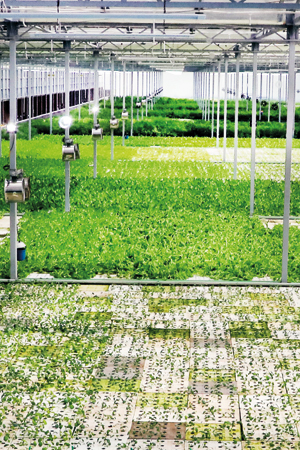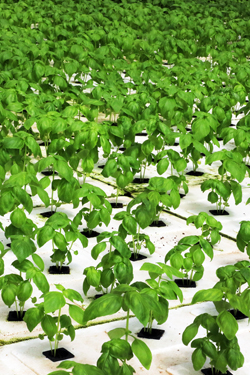A sustainable green model

Large complex: Grow Eden’s greenhouse. Pix by M.A. Pushpa Kumara
The gentle scent of basil fills the air and later one leaf crushed between the fingers of another variety gives out a slightly stronger scent.
The first is Sweet Thai basil and the second Genovese basil, we learn, while fascination rises when we see the super food Tuscan kale, with the curly-edged leaves taking the shape of dinosaurs.
These are the ‘bouquets’ being offered not just through a silent green revolution but also an aquaponic process not tried before on this large commercial scale in Sri Lanka.
Now in supermarkets across the country, the ‘Grow Eden’ produce includes herbs such as basil and parsley; leafy greens such as kale, chard, spinach, arugula known as rocket and several varieties of exotic lettuce – Romaine, butterhead, crispy or crystal and red coral – and salad cucumbers and cherry tomatoes.
We are on a visit this Tuesday to a large state-of-the-art greenhouse in Sri Lanka – just 8km off the Bangadeniya junction on the Anamaduwa Road in the Arachchikattuwa Pradeshiya Sabha area.
It is a family-run business and before we get into the ground details, the significance of the company’s name is underscored. It is with staunch faith that this family has launched Grow Eden linking it to the pure produce, good for a person’s physical and mental well-being in the original Garden of Eden, while the main company is Dei Gratia which denotes “by the grace of God”.
“While our vision is to be a global leader in high quality, nutritious food, we want to be a model on how it can be achieved through ethical, quality and standard based practices,” says Chairman Millan De Silva.
And so they set about getting the land and putting the logistics in place and believe that the company is the largest commercial aquaponics venture in Southeast Asia.
 Smilingly, son and Chief Executive Officer, Minol, harks back to a time when Thaththa, as a schoolboy tried out his hand at tapioca (manioc) cultivation.
Smilingly, son and Chief Executive Officer, Minol, harks back to a time when Thaththa, as a schoolboy tried out his hand at tapioca (manioc) cultivation.
Millan later diverted onto a different pathway, going abroad on a small job but making good in Oman as a quantity surveyor and setting up a strong business line. It was in 2018 that he felt he was “led” to return to his motherland.
“Look at Sri Lankan produce,” urges Millan. “We have top quality tea and spices and in West Asia nothing can beat our papaya and pineapple.”
However, there are gaps in climate-sensitive crops such as herbs and unique leafy-green vegetables which could be destroyed by the vagaries of the weather including droughts and torrential rains and also pests.
Younger son and Director, Mishan, who later takes us walkabout through the ‘farm’, chips in that consumers are fearful about contamination of their food, such as kos (jak) mallun being dipped in water laced with toilet cleaner.
“This is why an ethical model for agriculture fuelled our passion,” he says earnestly.
Minol continues the narrative how they looked at different technologies including climate-controlled greenhouses and aquaponics across the world in America, Israel, China, Hong Kong, Australia and even South America where the Amazon river is used to foster floating platforms with plants which suck up nutrition for their growth from the water teeming with fish.
Referring to the “way we grow”, Minol says that they use organic and non-genetically modified seeds from accredited sources, in a closed loop eco-system. As such all produce is organically grown and pesticide-free. The official stamps include from very difficult-to-get GLOBALG.A.P. and BRCFOOD and also Food Safety Management ISO 22000, GMP+ Feed Safety Assurance and SLGAP from Sri Lanka’s Department of Agriculture.

State of the art process: Automated seeding; (top left) handplanting some seeds (above left) and the seedling (right)
The aquaponic process involves the tilapia fish. Microbes are used to convert the fish waste to fertilizer (nitrogen, potassium and phosphorus) which is then absorbed by the plants along with nutrients. The plants also filter the water, which returns to the fish. Minol says: “When comparing this sustainable agriculture system with traditional practices, here only 20% of water is used across five years, while growing six times the produce for a set land area. We are also re-using 2 million litres per annum of rainwater.”
He underscores how they balance the system and keep it flexible. To build up the nutrients (nitrogen, potassium and phosphorus) in the system and maintain a healthy balanced pH (the measure of how acidic or basic a solution is) in the water, it takes 4-6 months. Once the aquaponic system is balanced they can grow 40 varieties simultaneously throughout the year, while also having the ability to change the type of crops and deliver them, if there is advance notice of 40-60 days.
 Nestling within 19 acres, the production area of 17,500 sqm is home to the greenhouse, the tanks which accommodate 100,000 fish per annum, the research and development (R&D) facility and storage and office space. The total investment to date is around Rs. 1.5 billion.
Nestling within 19 acres, the production area of 17,500 sqm is home to the greenhouse, the tanks which accommodate 100,000 fish per annum, the research and development (R&D) facility and storage and office space. The total investment to date is around Rs. 1.5 billion.
Donning coats, caps and shoes and washing our hands at several points so as not to cause contamination, we walk through the whole farm, witnessing the seeding process, either in loose coco peat or plugs, some hand planted but mostly automated, the darkened germination rooms with their very low temperatures and humidity controls and into the nurseries in the greenhouse where the seedlings are left for a few days. Thereafter, the seedlings are planted, depending on the crop, either on floating boards (herbs and leafy greens) seen on our Magazine cover or sent up a trellis (vegetables).
At each and every point the seedlings, plants and yield are checked, says Mishan, later leading us into the packing room, the walls of which have posters on what to discard if not up to standard. It is thereafter that the best is packed, with the promise “from farm to home under 24 hours”.
The laurels are flowing. Says one consumer,“addicted to your kale and Swiss chard” and another: “Greens were exceptional…….never found kale that good!”
Searching for an ideal partner? Find your soul mate on Hitad.lk, Sri Lanka's favourite marriage proposals page. With Hitad.lk matrimonial advertisements you have access to thousands of ads from potential suitors who are looking for someone just like you.


